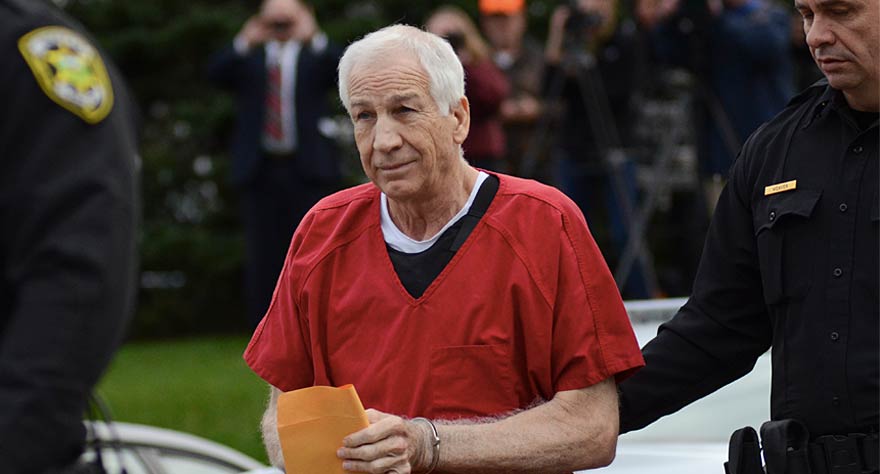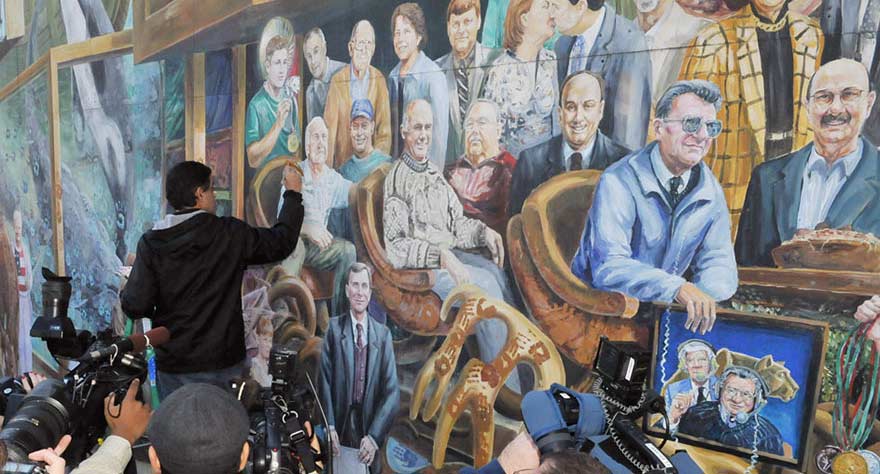
The exploration of Penn State's child abuse scandal shows how proximity to greatness clouds perception of guilt.

The exploration of Penn State's child abuse scandal shows how proximity to greatness clouds perception of guilt.
To anyone with no allegiance to Penn State University, or to those living outside both the college’s immediate area and the greater Philadelphia media market, the school’s 2011 child sex abuse scandal, while devastating and heartbreaking, was a straightforward story. An assistant college football coach was accused of committing heinous acts against children. There was a trial and a conviction, followed by terminations and resignations at the school. The terrible crimes made the news because they were terrible crimes. The news cycle was drawn out because it involved Penn State, a nationally recognized college and extended even further because the story involved Joe Paterno, a head football coach for whom the word “legend” applies. Still, it was a straightforward story.
However, for those connected to the school and for those living in the greater Philadelphia media market, the story wasn’t so straightforward. It still isn’t. Happy Valley, the latest documentary from filmmaker Amir Bar-Lev, not only documents the scandal, it explores the complexity created by the involvement of its participants, and how the proximity to greatness, in both geography and emotion, can cloud the perception of guilt.
The convicted assistant football coach was Jerry Sandusky, and the facts of his crimes are laid out efficiently – and without sensation – throughout the non-linear story. Also made clear by the director is the attitude of the general public, regardless of affiliation or geography, towards Sandusky. While the degrees of venom may vary, the consensus is his crimes were horrible and his punishment was deserved. He was a man who used his position of authority as a local celebrity and as founder of The Second Mile – a children’s charity, of all things – to commit unspeakable acts.
Presenting this story and the facts that fill it is the film’s easy part. The story becomes complicated by the involvement of Joe Paterno.
So larger-than-life was “JoePa,” it’s difficult to fully appreciate, or articulate, what he meant to Penn State and the community, but Bar-Lev captures that well, mostly through media coverage and fan interviews. Also, early in the film, Sandusky’s adopted son, Matt, refers to Paterno as “God,” and that’s about the best way to explain it. The reverence held for Paterno was indeed deity-grade, and shared by players, students, alum, locals, and even the media. That said, though, Bar-Lev makes it clear the coach had no God complex; he was a humble man whose fans held him in such high regard. Bar-Lev’s use of media and his own footage continues to sharply illustrate this in the wake of the scandal and Paterno’s involvement in it.

That involvement? In at least one specific abuse incident, Paterno knew what Sandusky had done but had “only” reported it to college executives. It was that minimum effort that cost the coach his job. His fans said he had done enough and was without culpability, but an independent investigation, as well as a contingent of detractors (one that grew exponentially in relation to the distance removed from the school), alleged that Paterno had an obligation to follow-up on his report and do more than only the bare minimum, especially given the seriousness of the accusation and Paterno’s power and influence within Penn State and the community.
The complexity increased again when Joe Paterno died of lung cancer just two months after being fired. Suddenly, everyone who had become an overnight legal expert would be left to stand by whatever Paterno had already done or said, as well as by the faith of their own convictions. The NCAA whipped the lather further when it levied devastating sanctions against the school.
While less salacious than the accusations against Sandusky, this increasing conflict between (and in some cases among) the Penn State community and others is where Bar-Lev’s doc is strongest and most interesting. Through interviews with Matt Sandusky, Paterno’s sons Scott and Jay and his wife Sue, the head coach’s biographer Joe Posnanski, several fans and community members, as well as others, Bar-Lev shows just how impassioned the community was and how divided it became. There is one terrific scene in particular, that takes place next to Paterno’s statue at the football stadium, that is the perfect example of the strife between those who think Paterno did enough and should be remembered for his coaching and community greatness, and those who think Paterno failed to prevent children from being harmed, something no community or collegiate history can allow forgiveness for.
There is an ongoing father/son theme running through Happy Valley that works well against the backdrop of football. Not only were Paterno and Sandusky regarded as God and Jesus, Sandusky was a father-figure to countless underprivileged children at The Second Mile; Paterno’s sons have stood by their father; Sandusky’s son has taken a very different (and justified) approach to his; and the denizens of State College, PA, home of the Penn State Nittany Lions, regard Paterno … THEIR coach … as the ultimate father figure.
By the end of the film, Bar-Lev leaves the decision up to the viewer as to whether or not Paterno was right, wrong, or somewhere nearer to midfield.